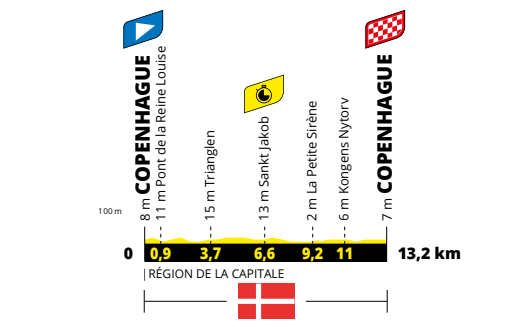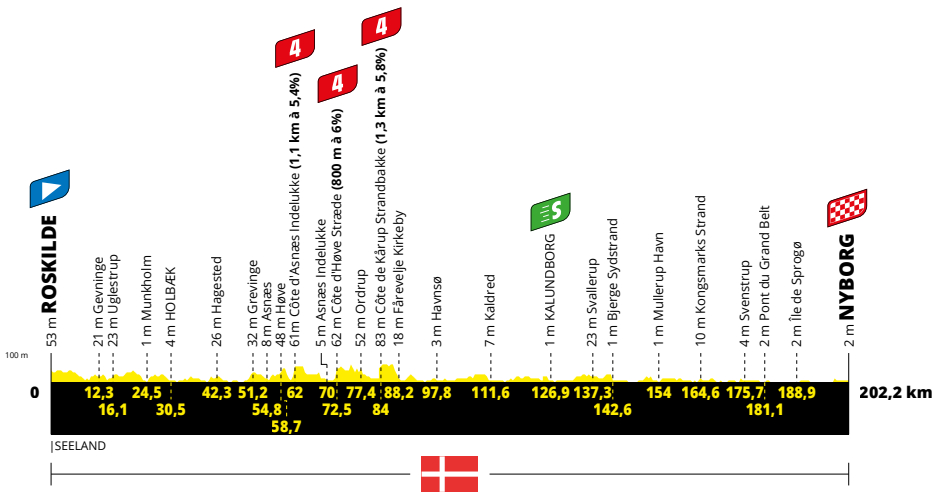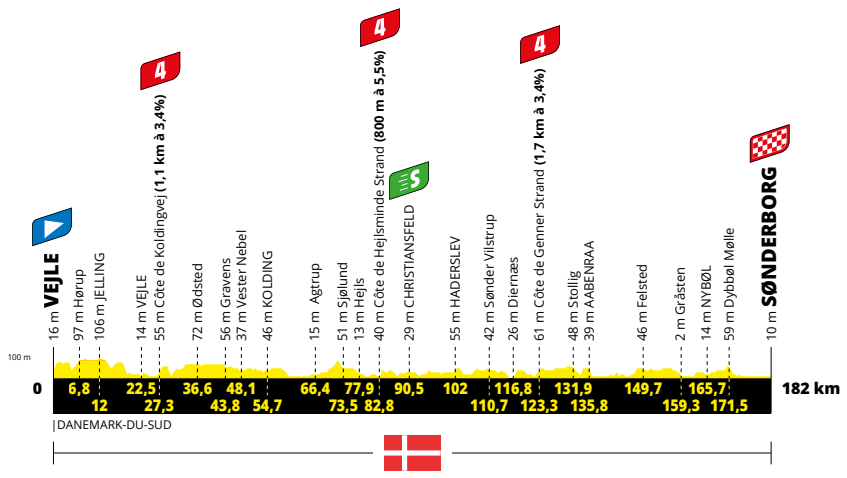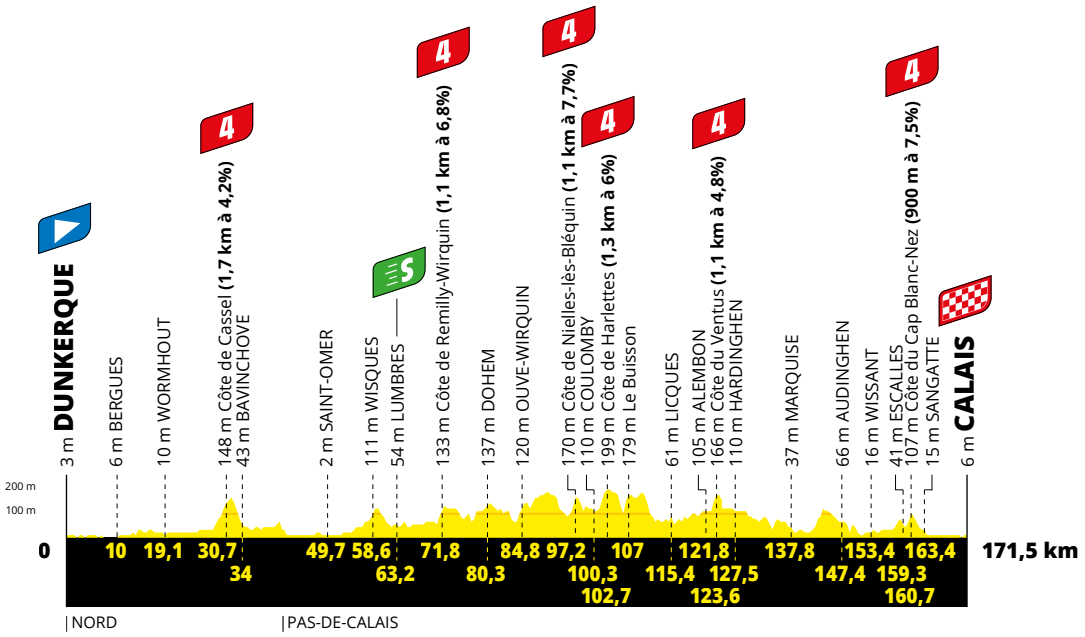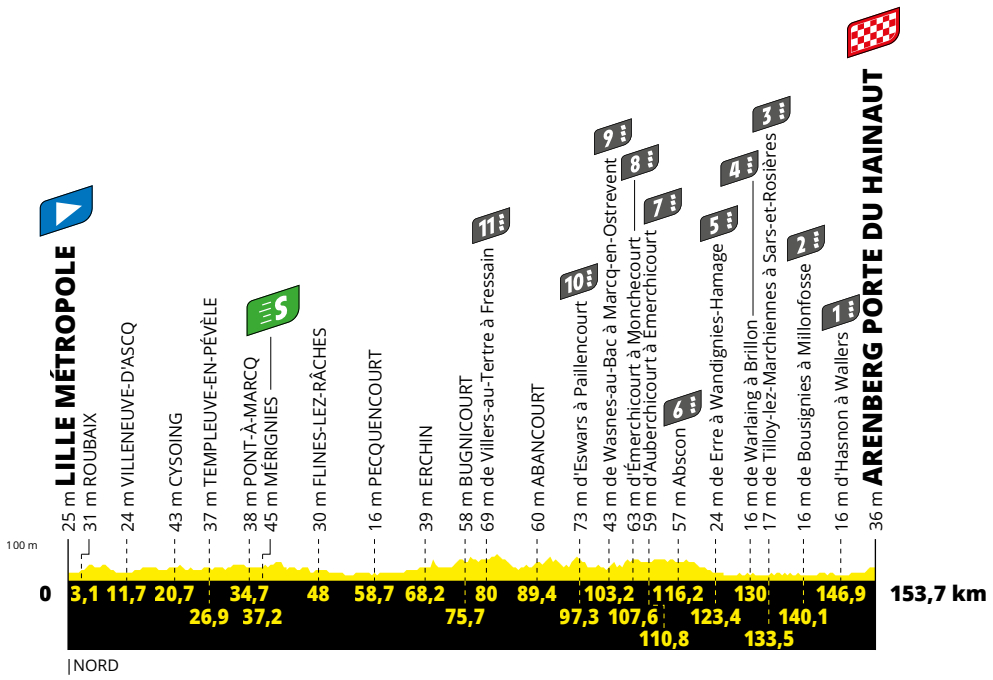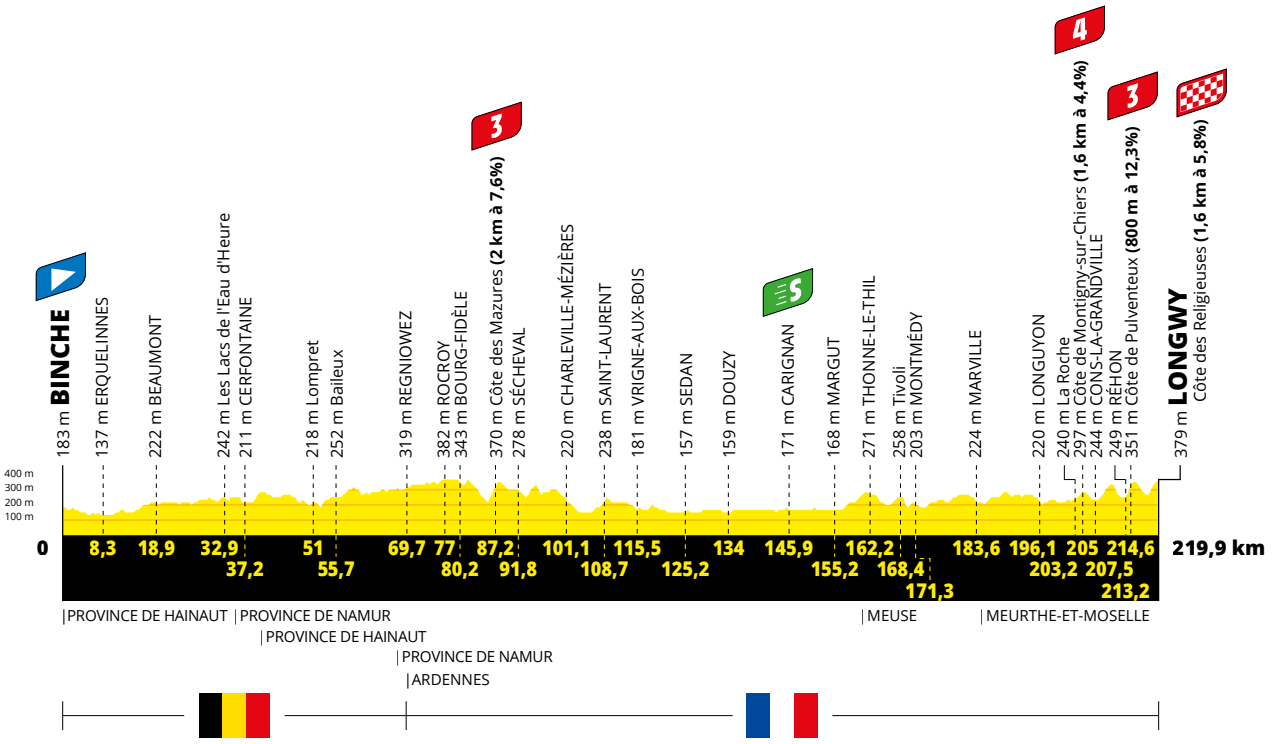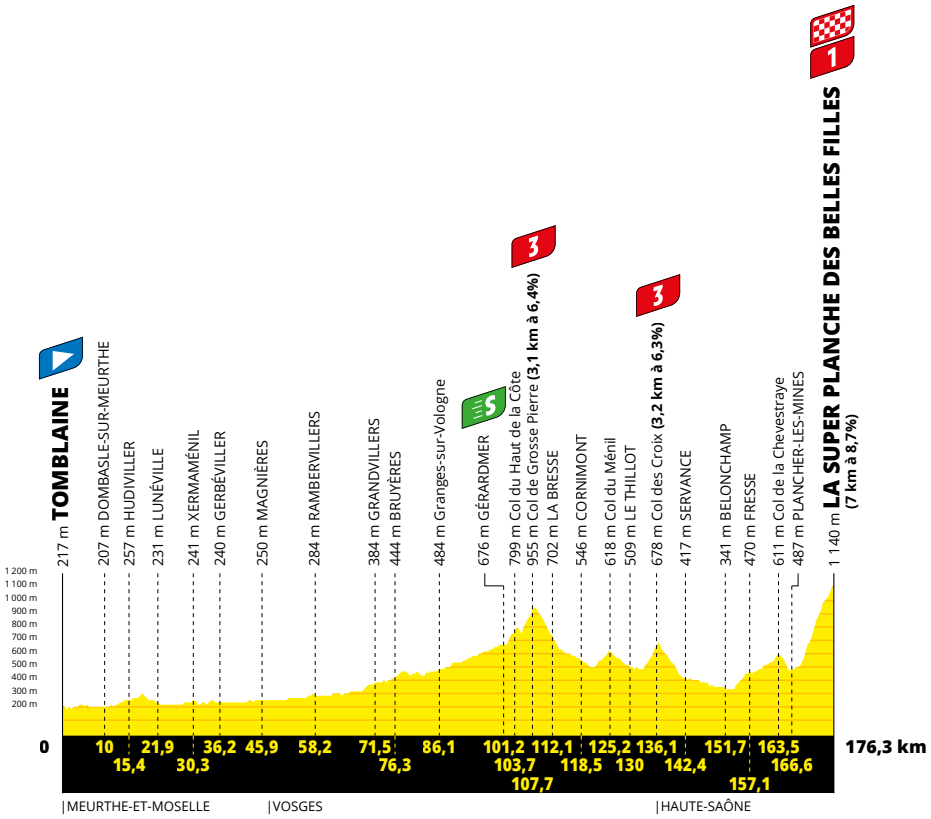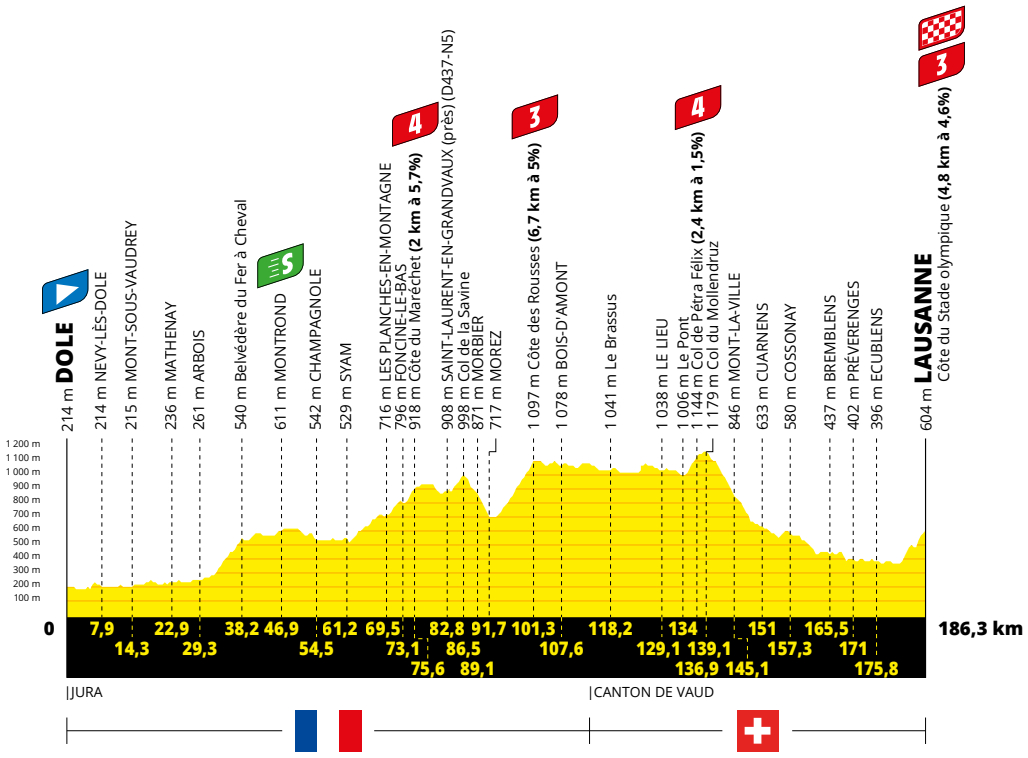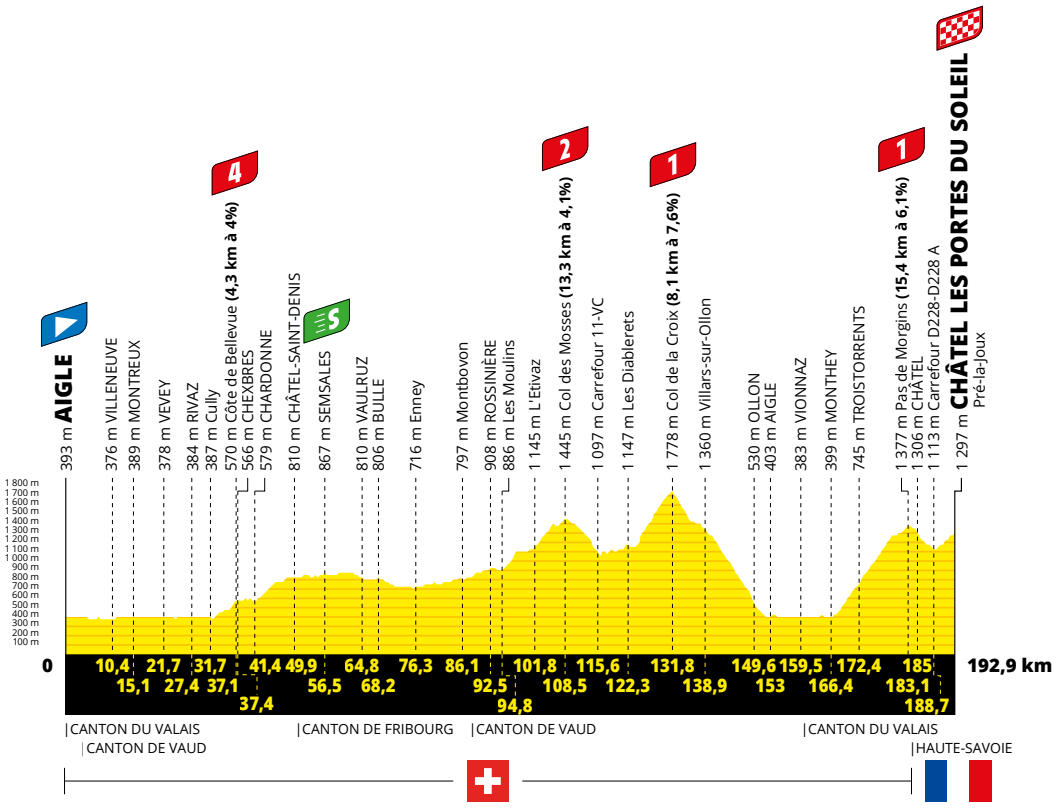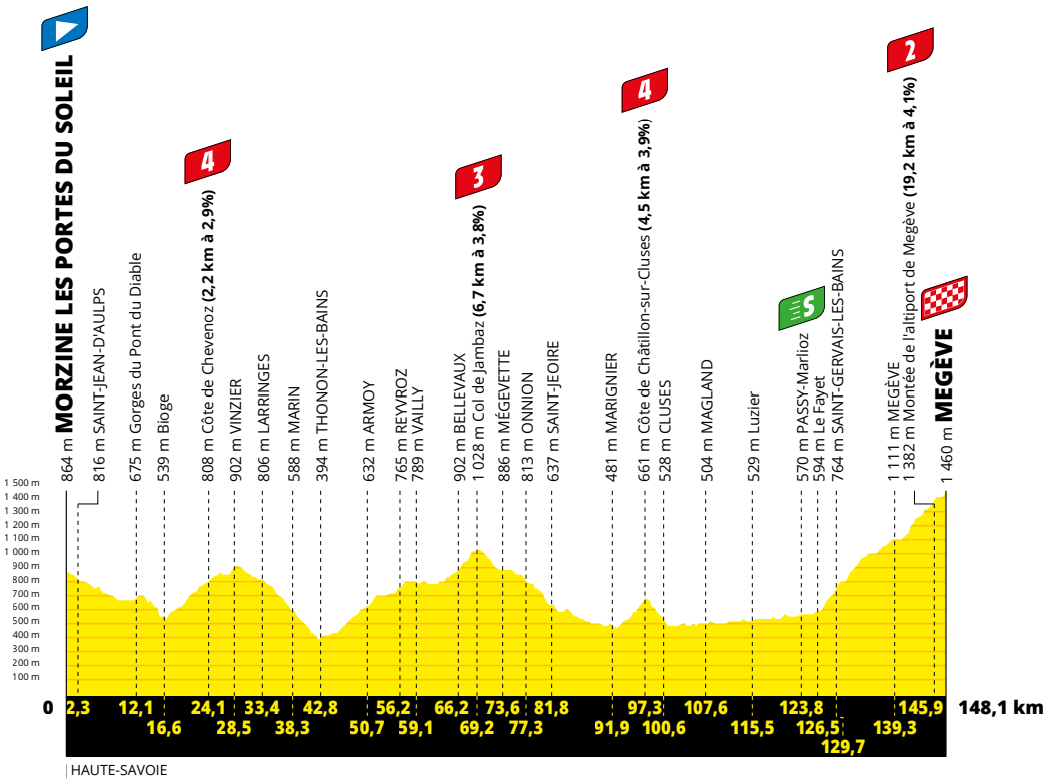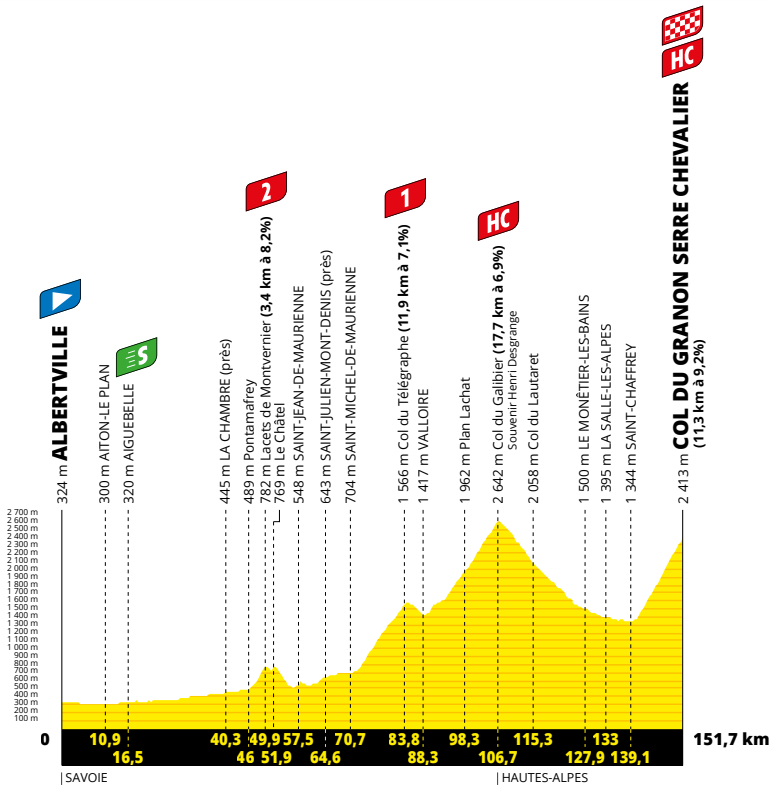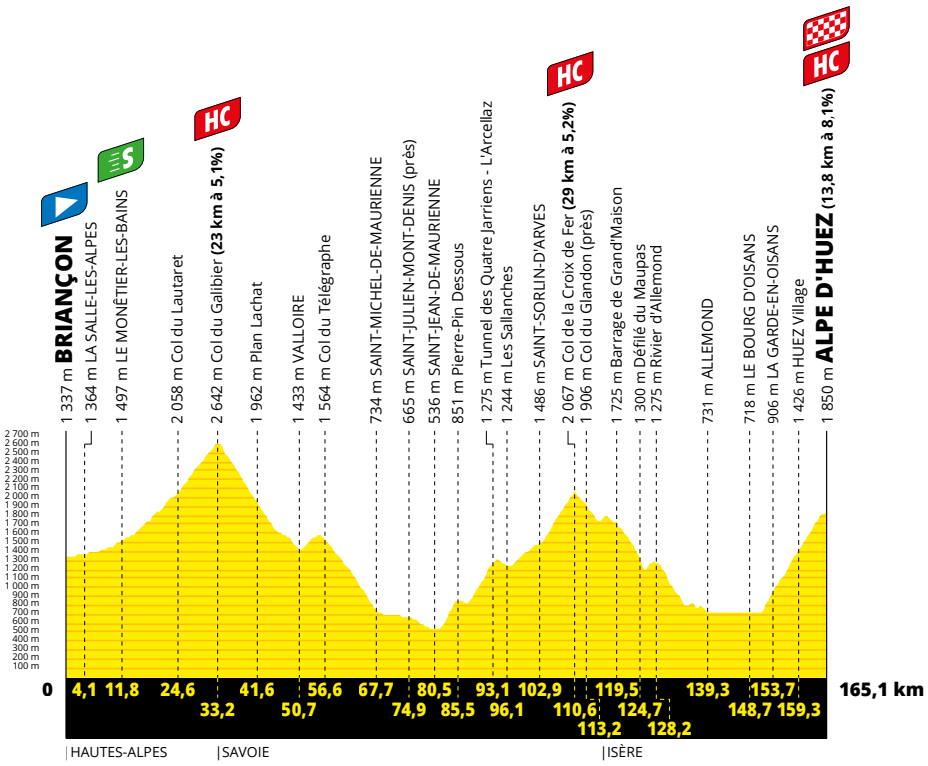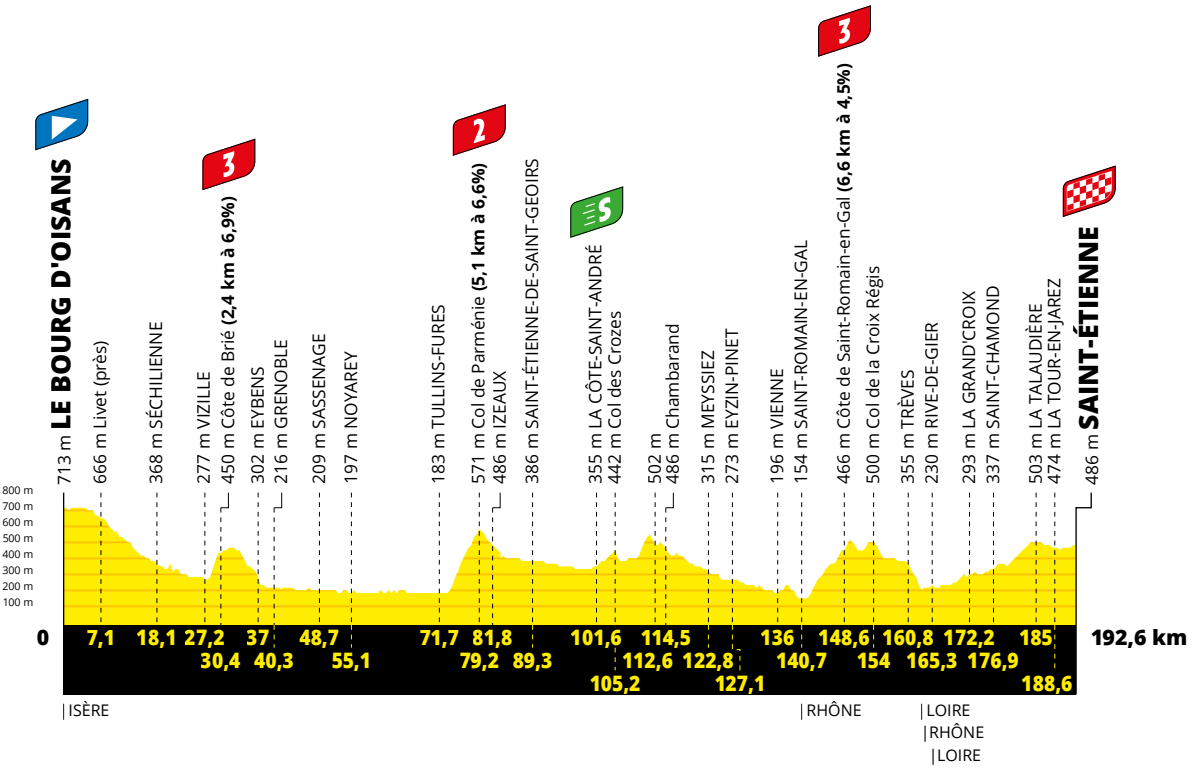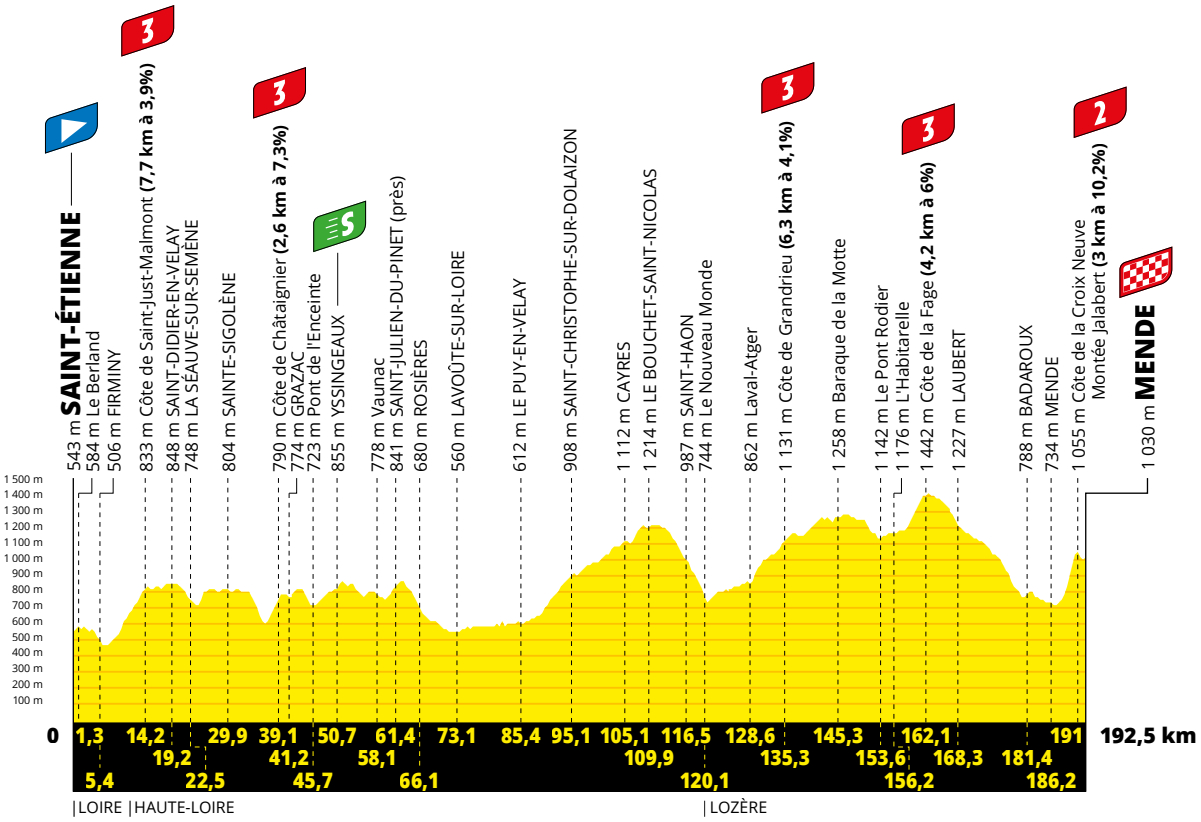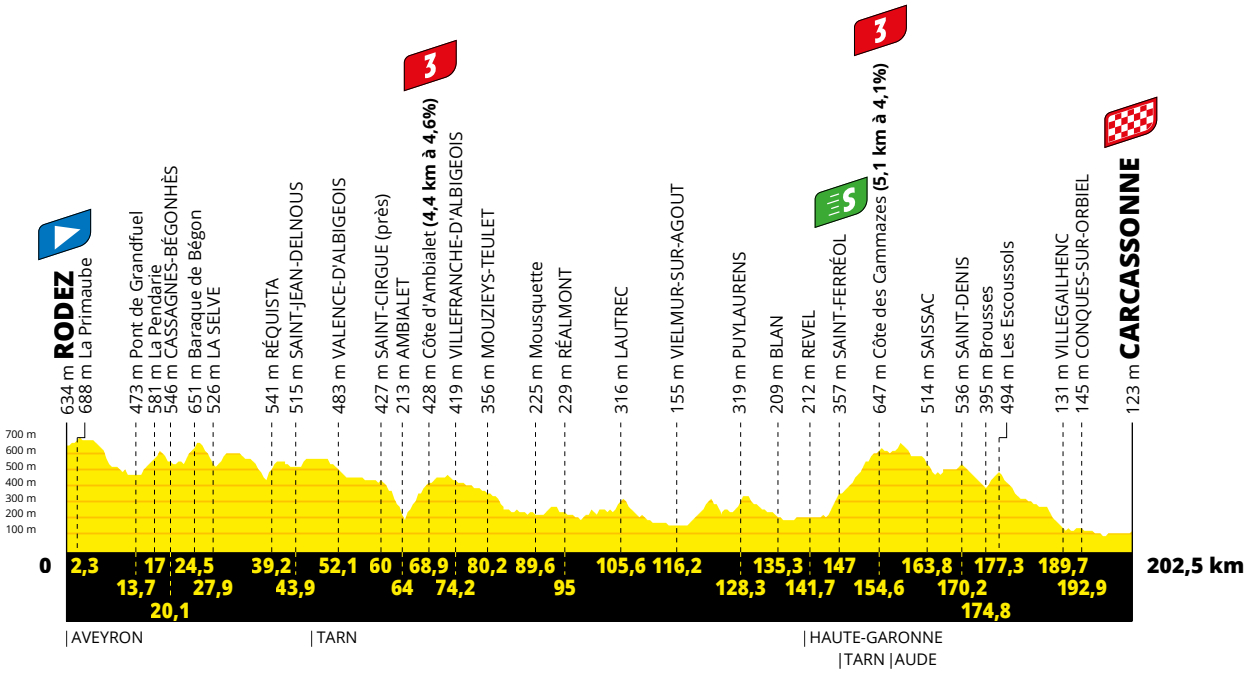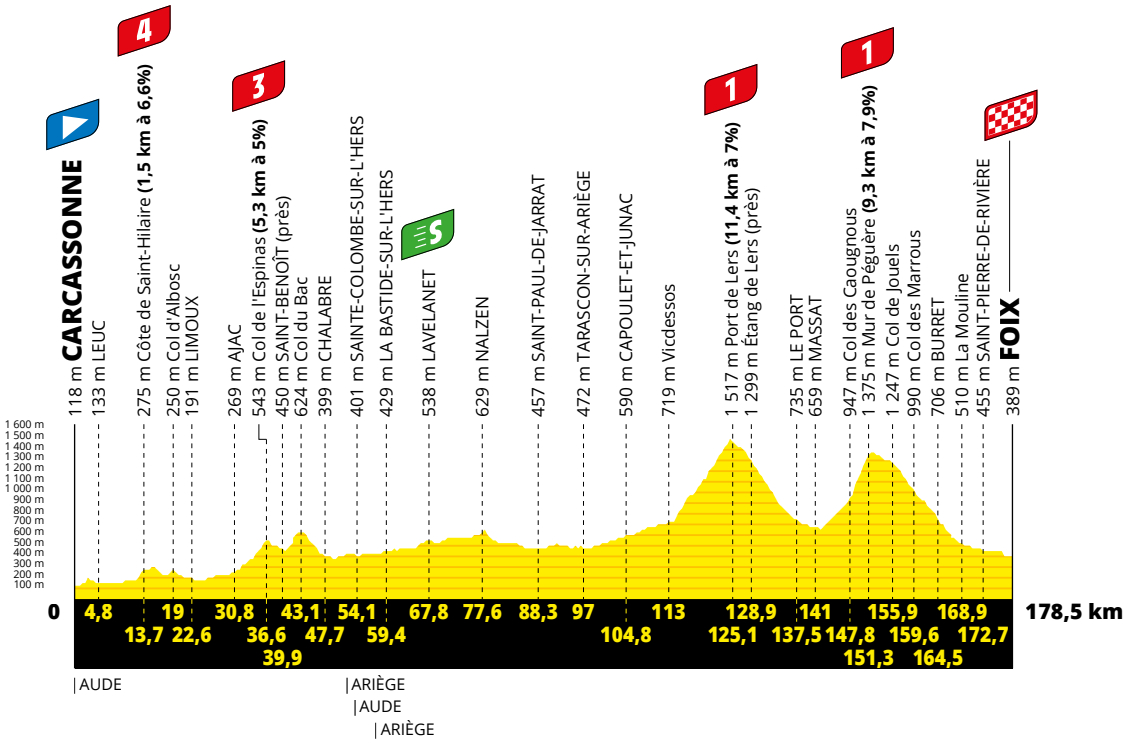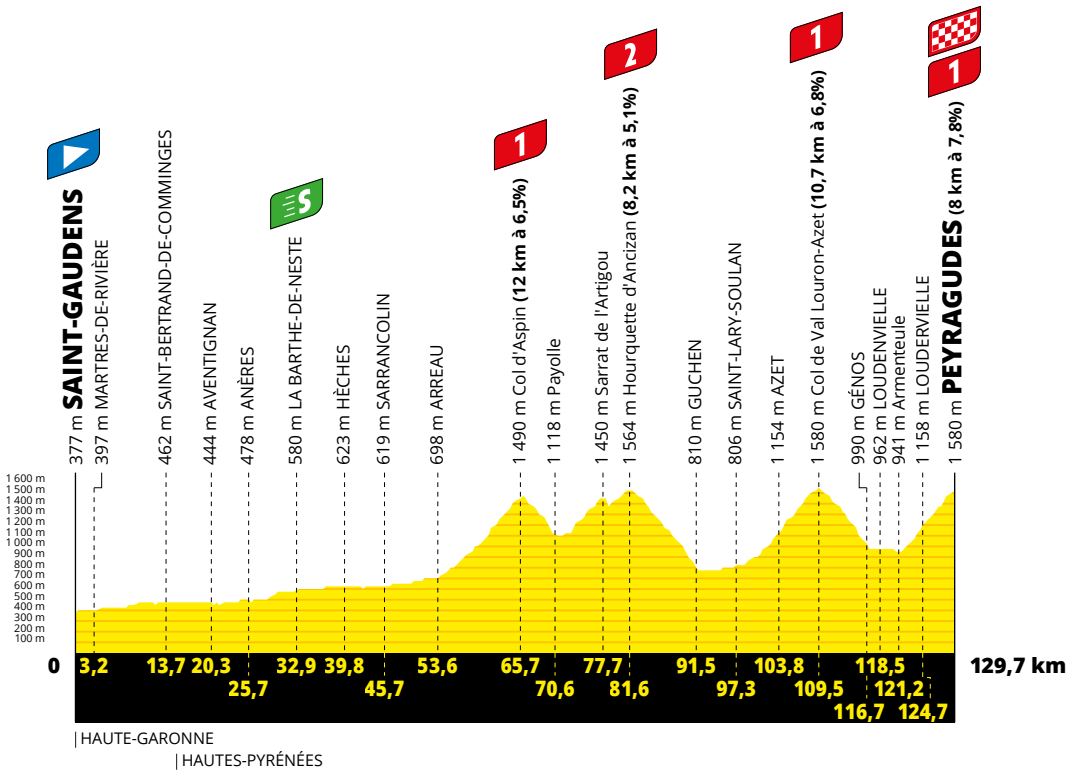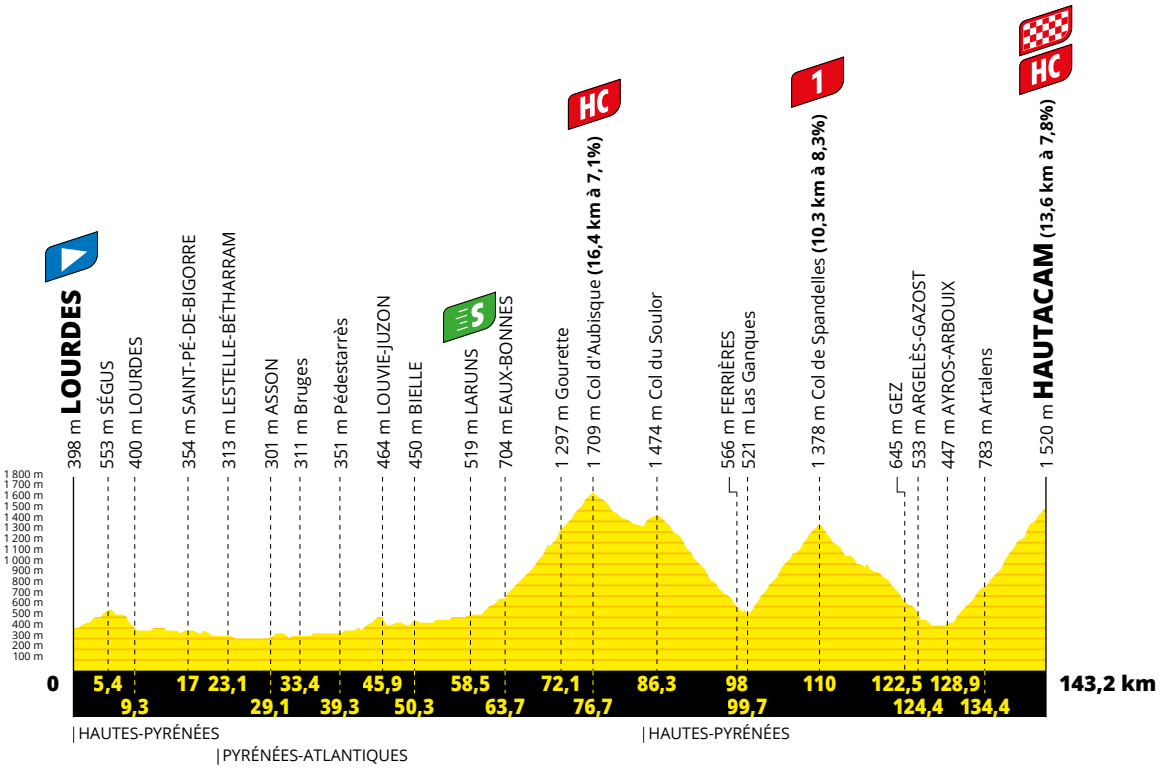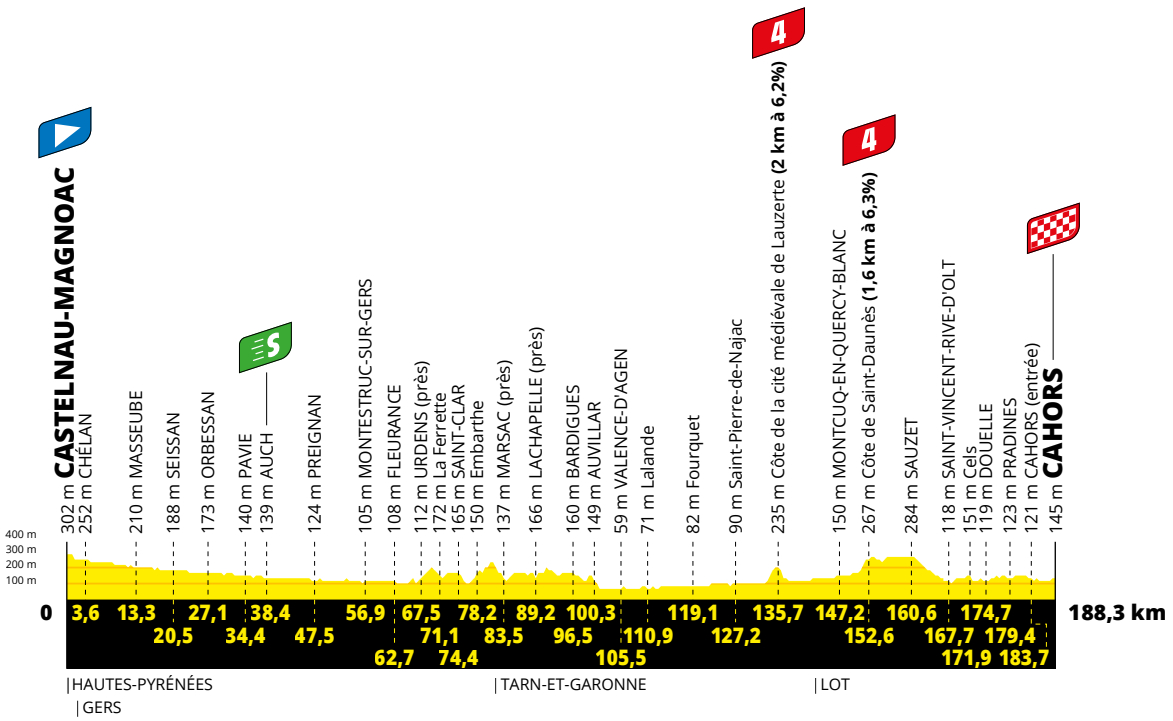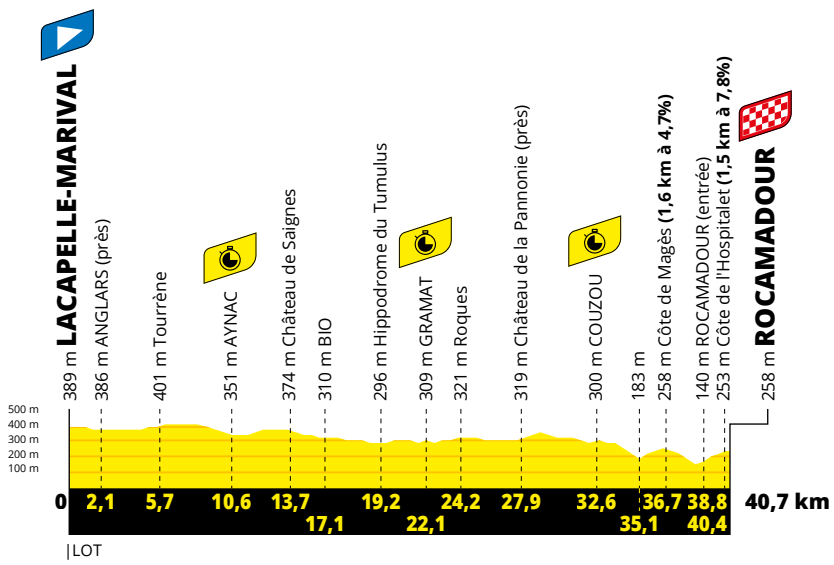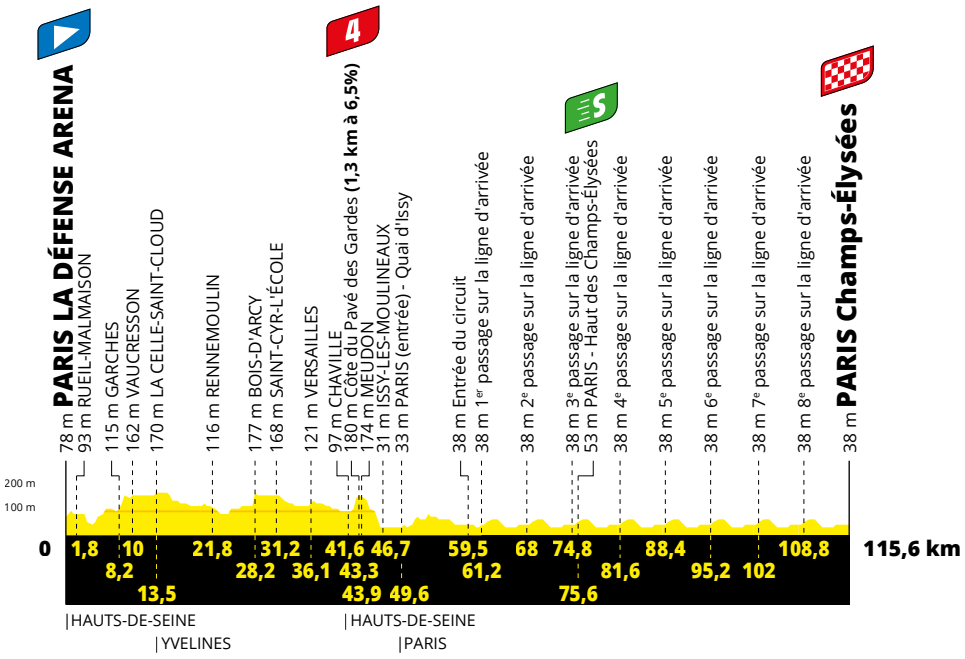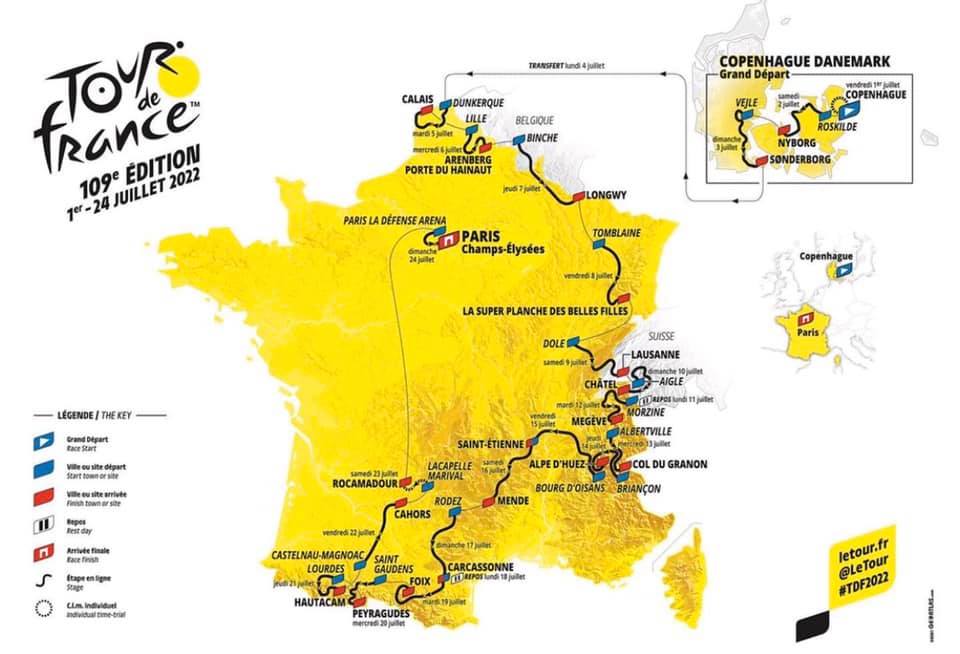By @EchelonsHub
The big one! July is Tour de France month, and the Grand Boucle is right on the doorstep – perhaps the most popular, the most reported and the most iconic of all pro cycling races. Three weeks of racing on our hands which will include furious sprints, technical time-trials, explosive hilly stages, colossal mountain days and countless battles for every classification on offer.
First Week
The Grand Depart takes place in Copenhagen this year. A flat start, the opening day will see a 13.2-kilometer technical time-trial in the streets of the Danish capital which will see the first yellow jersey emerge.
Stage two will be the first opportunity for the sprinters, as the riders will head into Nyborg. A calm day perhaps, however if the wind blows the finale over the 16-kilometer long Grand Belt bridge may cause havoc in the peloton.
Stage 3 will see the peloton say goodbye to the Scandinavian country, with a stage that is more likely to see a regular bunch sprint in the southern city of Sondeborg.
In the fourth day of racing the peloton returns to familiar French roads. This will be a day for the sprintes, however it includes quite a few hilltops throughout the day that may spark some surprises in northwestern France.
The fifth stage is a highly antecipated day. A short stage with only 153 kilometers on the menu, however 19.4 of those will take place over cobbled roads. 11 sectors to be exact, all of which in the second half of the stage. It will be an important day for the overall classification, as the tension will rise to an all-time high and crucial losses can be had if something goes wrong.
Stage six starts in Belgium over in Binche, however it’s a short stay as the riders come into France for an Ardennes-style finale. The town of Longwy will host the finish of the stage, with a sequence of short but steep hills making for an exciting day in which the puncheurs should thrive.
Stage seven will have the riders race into the Vosges. As is traditional the Planche des Belles Filles will be the first real summit finish of the race. It will be the first opportunity for the climbers to make differences in their terrain, and will be a good gauge to measure who will be capable of fighting for the win and podium in the end.
Stage eight will have the peloton cross the border once again, this time into Switzerland. The city of Lausanne will host the finish, on a short but explosive climb which will make for a thrilling finale.
The final day of the first week will see the riders head into the Alps. The finale in Châtel will be the second mountain test, however the first with long more traditional type of ascents. With the rest day looming ahead the general classification is likely to be played, as the climbers will begin a four-day battle in the mountain range.
Second Week
The second week begins with a tricky day. A short stage from Morzine into Megève. On first glance a mountainous stage, but in reality a day where the puncheurs and rouleurs can also succeed – as the tricky profile doesn’t include any harsh gradients.
Stage 11 will see the first big high-mountain stage. The menu isn’t complicated, with the Lacets de Montvernier, Col du Telegraphe and Col du Galibier taking the riders through high altitude. It will be a brutal day, as the riders will descend into Briançon and climb the Col du Granon for the highest stage finish in the race.
Stage 12 will be the final in the Alps, as a hattrick of ascents will mark the day. The riders will early on climb the Col du Galibier via the opposite direction, followed by the Col de la Croix the Fer, and the return of the Alpe d’Huez for the stage finish.
Stage 13 will have the peloton travel from the Alps into the Massif Central. A day for the sprinters, likely, however a lot can happen and besides the possibility of a breakaway succeeding, the several rolling hills will provide platforms for attacks to surge.
Stage 14 will the main day inside the Massif, with the hardest stage start of the entire race. It is a day spent in the hills, with rolling roads throughout the entire day and a slight uphill finish. By slight I mean short, but a very steep climb as the riders return to Mende to climb the Col de la Croix Neuve.
The final day of the second week will see the riders travel south, from Rodez into Carcassonne. It is another day designed for the sprinters however with plenty obstacles that may see a surprise pop out.
Third Week
Third week week starts with a hattrick of consecutive mountain stages. The first of which is the longest, from Carcassonne to Foix, a day that will be resolved in two ascents – the Porte de Lers and the Mur de Péguère. The final of those feature gruesomely steep gradients near the summit and will be a very dangerous day coming right after a rest day. The descent into Foix will have the riders in the finish very quickly after the climbs.
Stage 17 will have a pan-flat first half, and a very hard second half. A very short stage with only 129 kilometers on the menu, however featuring the Col d’Aspin, the Hourquette d’Ancizan and the Col de Val Louron-Azet before the final climb. That will be into Peyragudes, where more gaps will be established, with the finale in the brutal ramps of the local airfield.
The final mountain day comes right after. The formula is exactly the same as the day before, with a flat first half, short distances and a combination of similar climbs in the second half with a summit finish. Here however they will be longer, with the Col de Aubisque opening things up for the day, the Col de Spandelles dealing further damage and then the summit finish at Hautacam being the last ascent where the climbers can do real differences.
Stage 19 will be a transition day, as the riders head north for a flat stage. It is a day on paper for the sprinters, however this late into the race it will always be more complicated to chase down breakaways.
The final time-trial of the race will come on it’s penultimate day. The 40.7-kilometer individual challenge will be ridden between Lacapelle-Marival and Rocamadour, a rolling time-trial which is far from ideal for the specialists, with a hilly finale. Rocamadour is no stranger to high-level pro races, and the final hilltop is a familiar sight, albeit with added importance on this day.
And as traditional, the final day will feature soft distances and the classic final circuit inside of Paris, where the riders will finish the race off within the Champs-Élysées.
Race Map
GC Contenders
Tadej Pogacar – The defending champion. With good reason, Tadej Pogacar will be the number one favourite for most at the start in Copenhagen, as he took another dominating season with wins at the UAE Tour, Strade BIanche, Tirreno-Adriatico and Tour of Slovenia just before the Tour. Although not the best, UAE has a complete team, with a lot of climbers that see Majka, McNulty, Bennett and Soler in for important support roles on a sole objective for the race.
Primoz Roglic & Jonas Vingegaard – His closest competitors will be both Primoz Roglic and Jonas Vingegaard. Roglic, the three-time winner of the Vuelta a España is a proven Grand Tour winner, but has struggled to get through peak form Pogacar until today. This will be the first time they meet in a stage-race this year, which should come down to a thrilling battle. Perhaps just as impressive is Jonas Vingegaard, runner-up last year and perhaps the only climber who has successfully managed to put Pogacar in trouble last year. The duo, combined with an incredibly strong and complete Jumbo-Visma lineup, will make for a very dangerous team.
Daniel Martínez & Geraint Thomas & Adam Yates – Superior in depth however will be INEOS Grenadiers. The level is sky high and they’re missing Egan Bernal, however the British team will be having three riders capable of fighting for the top places. With a support team consisting of world’s best such as Filippo Ganna, Tom Pidcock and Dylan van Baarle, great damage can be made if they have a card to play for the podium or even win. Daniel Martínez, winner of Itzulia Basque Country and Top5 in many other World Tour races earlier in the year should be the most promising card, but the team also has Adam Yates and Tour de Suisse winner Geraint Thomas in the lineup which provides several options.
Aleksandr Vlasov – Perhaps the biggest question is how he is doing after a mistimed Covid-19 infection. Vlasov had been leading the Tour de Suisse after a stage win when he abandoned, and comes as a wildcard for te overall classification. Winner of the Volta a la Comunitat Valenciana and the Tour de Romandie, de Russian comes as a strong option and leader of the Giro d’Italia-winning BORA – hansgrohe.
Damiano Caruso & Jack Haig – Bahrain – Victorious will have a team focused on stage wins in one block, and overall classification in the other. Despite the absence of Gino Mäder, the team brings two options for the GC. One is Jack Haig, third at the Vuelta a España last year, the Australian has said to be fighting for a Top5 and is the type of complete rider that can thrive in such a race, with an uprising fifth place at the Critérium du Dauphiné he seems to be reaching the Tour in good form. Damiano Caruso is the second, he’ll be a dangerous card for the third week specially, as he’s shown last year at the Giro where he finished in second place. The 34-year old finished the Dauphiné in fourth place and is having a very similar run-up as to that of Haig.
Enric Mas – A crash at the Dauphiné was not the ideal run-up to the Tour, however Enric Mas is always a card to consider after his last two seasons where he’s finished twice fifth at the Tour de France, and second last year at the Vuelta a España. Movistar are a team that brings less firepower in comparison to others, but Mas is a consistent leader and strong performer in the mountains, again seeking a Top5.
Ben O’Connor – Third at the Critérium du Dauphiné, O’Connor was a revelation at last year’s race where he stormed to third place. The Australian has a team focused in him, with all the support AG2R could provide for the three weeks of intense racing.
David Gaudu – David Gaudu is not exactly the most consistent climber, which has him sit slightly below some other contenders. He is yet to finish on the Top10 of a Tour de France, however he will try once again and he’s proved to be one of the best climbers in the peloton on his best day over the last few years. Besides, Groupama have a team with several climbers who will be focused on stage wins, however they can provide Gaudu with crucial support as will the likes of Küng who put the Frenchman in a safe position towards the dangerous flat days.
Jakob Fuglsang – Winner of the Mercan’Tour Classic and third at a brutal Tour de Suisse, Jakob Fuglsang is seemingly back at his best level. Not a pure climber, however his time-trial at the Tour de Suisse was very promising and the Israel duo of him and Michael Woods seemed to have timed their form to perfection and will be looking to launch some fireworks in the mountains.
Nairo Quintana – Is it too late for Quintana? No! Sure, it has been a while since Quintana has been near the top at the end of a Grand Tour, but he has this year again shown his climbing prowess, and how he is still very much a contender for a Grand Tour podium. He will need to avoid occasional bad days which are relatively frequent, but Arkéa have a very strong tram for the windy and classics days. In the mountains the Colombian will only have to follow the wheels, and the altitude factor in the Alps will be very favourable to him.
Louis Meintjes – The South African is seeming to show signs of his very best level once again. Having won the Giro dell’Appennino and finished sixth at the Critérium du Dauphiné in June, it’s the best signs he could give ahead of the Tour. Intermarché will not be able to provide him with a lot of support so he’ll have to avoid loosing much unnecessary time, but the race is to be decided in the mountains and he’s showing a level strong enough to finish on the Top10 again.
Alexey Lutsenko – Lutsenko hasn’t shown too many good signs lately, however he is a rider that has since the beginning of the season hinted at a GC assault once again. He finished seventh last year, and will be looking to improve on that this year. Astana are in a similar position to Intermarché where a stage win will be the priority, and despite having struggled with injuries the Kazakh looked to be coming back into form at the Tour de Suisse.
The Sprinters/Green Jersey
Wout van Aert – He’s finally admitted to be going for a green jersey! Wout is possibly THE most complete rider in the peloton, and the points classification is rewarding for that kind of rider, as long as he can sprint which the former Belgian champion absolutely can. He will not have a specialized leadout such as other teams, but his consistency, support of Christophe Laporte and slight freedom for Jumbo-Visma will have him as a main favourite for the green jersey.
Fabio Jakobsen – A top pure sprinter with a top leadout. Jakobsen will be a strong candidate to take at least one win, but likely also the rider who will do best in the pure sprint stages. Quick-Step know how to play the game, as Jakobsen will have the leadout of Michael Morkov, Florian Sénéchal, Yves Lampaert and Kasper Asgreen to help him towards the wins and the green jersey objective.
Jasper Philipsen – Leader of Alpecin-Fenix this year, with no competition in the sprints as Tim Merlier will not be present this year. Philipsen will be missing a key part of his leadout in Rickaert, however Alpecin will exclusively be focused on stage wins and the flat and hilly days, meaning he’ll have plenty of rouleurs to guide him through the final kilometers, Philipsen finished on the podium six times last year and will be trying to get a win this time, and his brilliant positioning skills will be a great weapon.
Caleb Ewan – Contrary to Philipsen, Ewan is just about one of the most inconsistent sprinters. However, he’s one of the very fastest at the same time. He will not have his traditional leadout here, with Reinardt Janse van Rensburg, Florian Vermeersch and Brent van Moer instead being the names who will help him in the sprints throughout these three weeks.
Dylan Groenewegen – Groenewegen has had a very mixed start to his stint at Team BikeExchange – Jayco, with some inconsistency but since May showing some speed. He’s taken wins at the Tour de Hongrie, Veenendaal-Veenendaal Classic and Tour of Slovenia. Sure, not the races with the most reputation, but he’s shown his speed. BikeExchange are in trouble, and at the Dauphiné he’s shown the climbing remains a big issue, however in the pan-flat stages the Dutch sprinter will be an option as long as he manages to get his positioning right.
Mads Pedersen – Pedersen will have a Grand Depart at home, a traditional leadout, a lot of sprinting power and some impressive climbing on his best days too. He’s a straight perfect candidate for the points classification, but it’s unclear if he will be targeting it. Nevertheless, Trek’s sole goal is stage wins so he will not share leadership with anyone, and with wins at Etoile de Bessèges, Paris-Nice, Circuit Cycliste Sarthe, Tour of Funen and most recently Baloise Belgium Tour, his season is packed with confidence and includes some strong performances in the hilly stages.
Alexander Kristoff – Kristoff comes as a bit of a wildcard, a traditional but card from the past, however he is far from done! Three wins this season, including a solo win at Scheldeprijs. If it rains he will be a threat in any sort of sprint stage, but even if not he will have a strong leadout that has worked well since the start of the year with Andrea Pasqualon and Adrien Petit.
Peter Sagan – With a late bout of Covid-19, but the Slovakian managed to save the situation and returned to take a win at the national championships. With a last-minute change, Sagan has gained Boasson Hagen as a leadout man, but his two trusted men Daniel Oss and Maciej Bodnar will too be present. Sagan has just returned to his winning ways at the Tour de Suisse and seems to finally have some sort of competitive form, and with his positioning skills he’ll be a card for the bunch sprints.
Furthermore some more names will feature in the sprints. In the pan-flat ones, the likes of Alberto Dainese and Max Walscheid will be very interesting names, who are also possibly wildcards specially if the wind blows on some stages. There will be some hillier days suited for the sprinters so the likes of Bryan Coquard, Hugo Hofstetter and Magnus Cort Nielsen will also be brilliant sprinters to keep under eye in some days. Danny van Poppel will be leading the BORA – hansgrohe leadout after Sam Bennett’s absence and will be another interesting card for the fast finishes.
Time-trialists
The opening time-trial will decide the first yellow jersey of the race, and likely for the first few days. Although in the penultimate day of racing it will be much more open, stage 1 will be crucial for exposure and for a career-long achievement. Every single detail has been worked on by some riders, some of the main favourites are already written above, but riders who will be focusing on this day above all others are Filippo Ganna, Stefan Küng and Stefan Bissegger.
Others
Furthermore, what the Tour de France has of more special is the sheer depth of quality. Entire teams filled with stars, riders capable of winning stages at such a level. Each breakaway stage will be filled with world-class riders even if they’re not fighting for any classification. You have, mostly in the hilly stages, riders that will fight for the wins such as Mathieu van der Poel, Tom Pidcock, Benoît Cosnefroy, Benjamin Thomas, Max Schachmann, Matej Mohoric, Dylan Teuns, Valentin Madouas, Tim Wellens and Michael Matthews.
Climbers that won’t be targeting the general classification are also of a very high level here, specially with a KOM jersey on the line aswell. Thibaut Pinot, Felix Grossschartner, Guillaume Martin, Ion Izagirre, Rigoberto Uran, Michael Storer, Romain Bardet, Ruben Guerreiro, Giulio Ciccone and Michael Woods are some of the names we should see in escapee groups at the high mountains – besides some who will inevitably drop out.
There will also be a cobbled stage, where the yellow jersey is likely to change hands, the GC can see chaos from all sides, riders can crash out and drama is very likely. Some riders will be on domestique duty, some have been mentioned above, but the quality in the field is also extremely high also also features the likes of Dylan van Baarle, Jasper Stuyven and the Quick-Step trio of Kasper Asgreen, Yves Lampaert and Florian Sénéchal.
Prediction Time
⭐⭐⭐ Tadej Pogacar, Primoz Roglic
⭐⭐ Jonas Vingegaard, Daniel Martínez, Aleksandr Vlasov
⭐ Geraint Thomas, Adam Yates, Ben O’Connor, Enric Mas, Damiano Caruso, Jack Haig, Jakob Fuglsang, Nairo Quintana
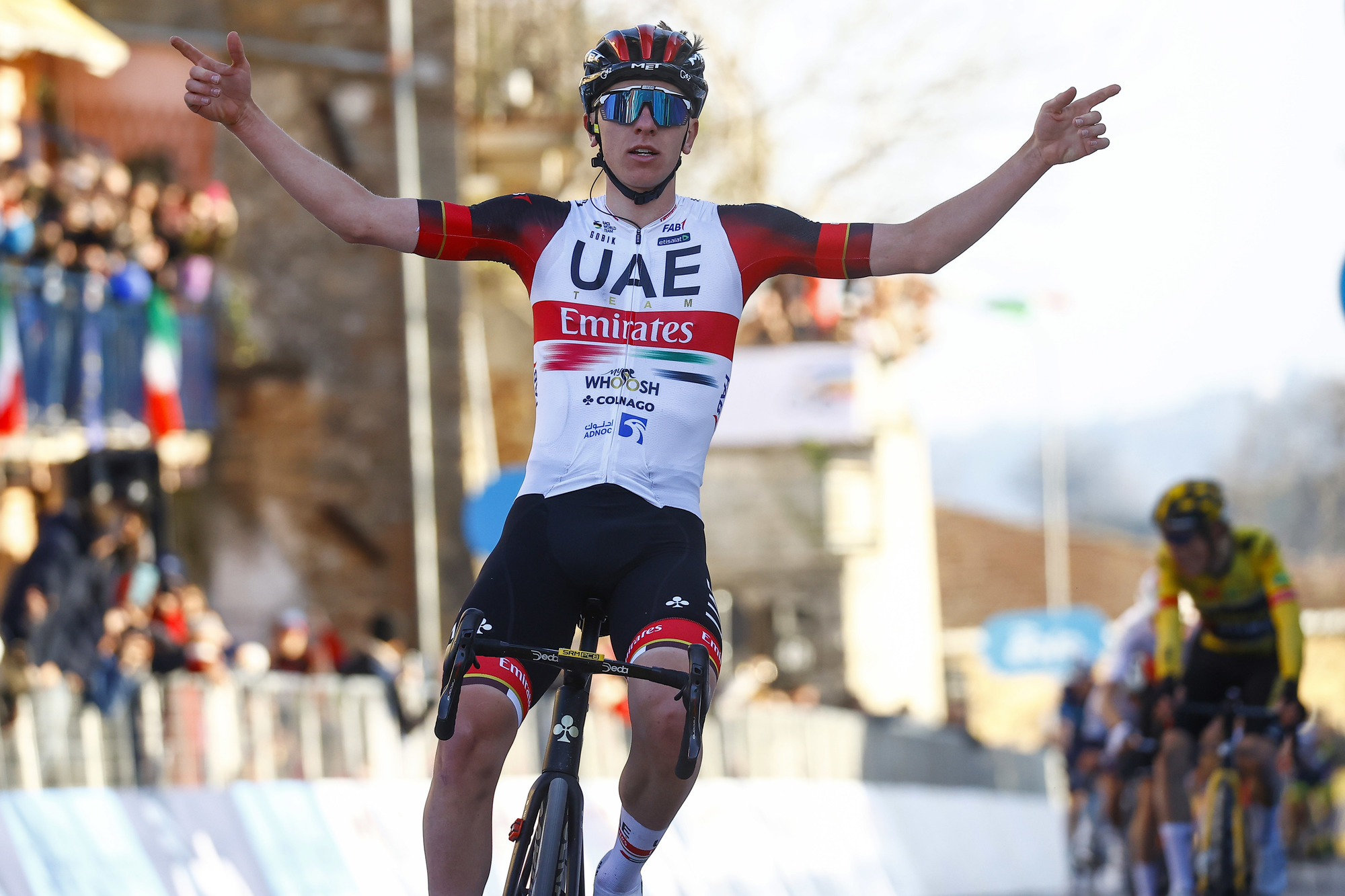
This will be an intriguing race. Jumbo-Visma ARE stronger than UAE Team Emirates, but if there’s a rider who’s proven to be just as strong without an incredible support it’s Tadej Pogacar. Despite Jumbo’s power – and the combined strength of many other rivals – I think Pogacar is the man to beat, and UAE’s sole focus on one rider will be crucial. He’ll be consistent and complete, and the strongest climber in the race I believe, and will win a third Tour de France.
Zweeler is a fantasy sports game that includes many sports and cycling is no exception. I ask that you check it out, if you register with the link below you will not only be joining an exciting game but will also be personally supporting me and my work, and allow me to make more content for you!
Tomorrow’s race has prizes of at least €20.000 and an entry fee of only €10. Make good use of your knowledge!
https://zweeler.com/game/cyclingTour/FantasyTourdeFrance2022/main.php?ref=790
Rúben Silva
Follow us on Twitter and Instagram
Join us on facebook: Ciclismo Internacional
Copyright © 2012-2022 Ciclismo Internacional. All Rights Reserved
Discover more from Ciclismo Internacional
Subscribe to get the latest posts sent to your email.



